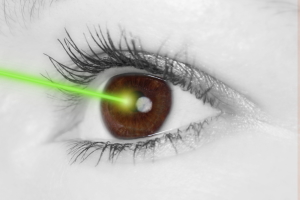Contraindications of LASIK Eye Surgery
March 10th, 2016
An increase in global cases of refractive errors has resulted in the increase in demand for eye surgeries for vision correction. For years there have been effective eye treatments and surgeries for refractive errors, but developments continually occur. One of the most common and consistently advancing procedures available today is LASIK eye surgery.
LASIK eye surgery is a corrective method to restore vision by reshaping the cornea. This allows light to focus correctly in the eye and results with significantly clearer vision. It is also the procedure we offer our clients in our LASIK clinics in Huntsville and Decatur. Although this is the most common and often preferred eye surgery by patients with refractive errors, a complete eye and health examination must be performed prior to deciding if the procedure is right for the individual. This is due to the fact that this laser vision correction method has certain contraindications to be considered.
At the Laser Eye Center, we encourage those who have been told in the past that they are not candidates for LASIK eye surgery to visit our office for a free consultation; advancements in LASIK have expanded treatment ranges and many more patients are eligible for LASIK.
There are two types of contraindications with regard to LASIK eye surgery:
Absolute Contraindication
A patient classified under the absolute contraindications for laser vision correction cannot undergo LASIK eye surgery. This is because this individual has a clinical finding that inhibits the procedure or overall health conditions that do not permit them to undergo LASIK.
Relative Contraindication
Someone with relative contraindications has a likelihood of achieving the same results, efficacy, and safety that other patients who receive laser vision correction usually enjoy. They may be allowed to undergo LASIK in Alabama, but the surgeon would have to take special precautions and the predictability of the results may be lower. There five conditions under this contraindication:
Thin Corneal Structure
An especially important aspect of pre-operative exams is to measure the thickness of a patient’s cornea. During the reshaping process of LASIK eye surgery, corneal tissue is removed from the eye and therefore there must be a threshold amount of corneal tissue to work with.
If a patient has a thin corneal measurement, it is possible other treatment options will be recommended to correct their refractive errors.
General Health Conditions
Patients who are immunocompromised and those with systemic conditions such as SLE, fibromyalgia, and rheumatoid arthritis can be considered as having a relative contraindication. People who are autoimmune may take a long time to heal and are at the highest risk of infection. Depending if your condition is controlled, LASIK may be a permissible option for vision correction.
Eye Conditions
Patients treated for glaucoma, a past eye infection from ocular herpes, and retinal detachment may still be considered for laser vision correction. This would be possible as long as the condition is prevented from reoccurrence using oral and topical medications.
Dry Eyes
Before patients have LASIK eye surgery performed, the surgeon checks if there is sufficient tear quantity and quality. If proven that the individual has dry eyes, the surgeon may recommend methods to enable adequate amount of tears for the procedure.
Stable Prescriptions
Our LASIK Surgeons in Alabama prefer to allow patients to undergo LASIK if their prescription has been stable for about 12 months prior to the date of the procedure. This is called refractive stability. Patients under 18 years of age are not permitted to under LASIK because their eyes are still changing.
These contraindications are to serve as guide to patients who are considering LASIK eye surgery. Our offices over FREE LASIK evaluations, so there is no risk in establishing if you are a candidate for LASIK.
Contact us today to get help or visit our LASIK surgery clinics in Huntsville and Decatur, Alabama!



